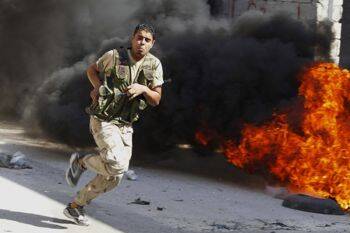The United Nations reports that more than 100,000 refugees escaped into neighboring states in August as violence in Syria escalated dramatically, the highest monthly total since the beginning of the Syrian crisis. U.N. officials were scrambling to respond to the health and nutrition needs of more than 1.3 million children within Syria and in surrounding nations at risk because of the violence.
“Conflict has disrupted health services across Syria so most refugee children and their families have not had access to routine immunizations or other basic health services,” the Middle East Regional Health Advisor for the U.N. Children’s Fund (UNICEF), Mahendra Sheth, said. “This work is vital because during a crisis children are most vulnerable to disease outbreaks and malnutrition, especially children living in camp settings like Za’atari,” he added, referring to a refugee camp in northern Jordan.
The agency, along with the Jordanian Ministry of Health, the U.N. World Health Organization (WHO) and other partners, are also launching a large-scale polio and measles vaccination campaign targeting more than 100,000 children in Za’atari, nearby transit centres, and communities hosting refugees in northern Jordan.
Meanwhile in New York, U.N. officials were urging a more vibrant international response to the continuing violence. A timely and decisive response is vital in the face of genocide, war crimes, ethnic cleansing and crimes against humanity, top United Nations officials stressed on Sept. 5, highlighting the need to act when a state fails to protect its own people.
“This is the ultimate test of the responsibility to protect,” Secretary-General Ban Ki-moon said in his remarks to an informal interactive dialogue of the General Assembly on the principle of the responsibility to protect agreed at a summit of world leaders in 2005.
Sometimes known as 'R2P,' the principle holds states responsible for shielding their own populations from genocide, war crimes, ethnic cleansing and related crimes against humanity and requires the international community to step in if this obligation is not met.
“The responsibility to protect is a concept whose time has come. For too many millions of victims, it should have come much earlier,” Ban said.
The Sept. 5 dialogue was the fourth held since 2009 and focused on timely and decisive response – the third pillar of the responsibility to protect.
“We all agree that sovereignty must not be a shield behind which states commit grave crimes against their people. But achieving prevention and protection can be difficult,” said Mr. Ban. “In recent years, we have shown how good offices, preventive diplomacy, mediation, commissions of inquiry and other peaceful means can help pull countries back from the brink of mass violence.
“However, when non-coercive measures fail or are considered inadequate, enforcement under Chapter VII will need to be considered by the appropriate intergovernmental bodies,” he added. “This includes carefully crafted sanctions and, in extreme circumstances, the use of force.”
Chapter VII of the UN Charter allows the Security Council to use force in the face of a threat to peace or aggression, taking “such action by air, sea, or land forces as may be necessary to maintain or restore international peace and security,” including blockades and other operations by the forces of Member States.
The Secretary-General pointed to the immense human cost of failing to protect the population of Syria, where more than 18,000 people, mostly civilians, have died since the uprising against President Bashar al-Assad began 18 months ago. He commended the General Assembly for its proactive response to the Syrian crisis. “It has shown that, while moments of unity in the Security Council have been few and far between, the rest of the world body need not be silent,” Ban said.
The U.N. chief added that the council’s paralysis does the Syrian people harm, damages its own credibility and weakens a concept that was adopted with such hope and expectations.
“Let us by all means continue to talk through the responsibility to protect in all its aspects. Each year we achieve greater precision and common understanding,” he stated. “But let us recognize that we face an urgent test here and now. Words must become deeds. Promise must become practice.”








